#Caliphate History
Explore tagged Tumblr posts
Text
youtube
#Abu Bakr#First Caliph of Islam#Prophet Muhammad's Successor#Islamic History#Wars of Apostasy#Khalid ibn al-Walid#Preservation of the Quran#Early Islamic Leaders#Islamic Unity#Muslim Community Leadership#Islamic Leadership#Medina#Islamic Caliphate#Islamic Succession#Early Muslim History#Islamic Leaders#Muslim Faith#Caliphate History#Islamic Governance#Religious Leadership#Islamic Legacy#Youtube
3 notes
·
View notes
Text
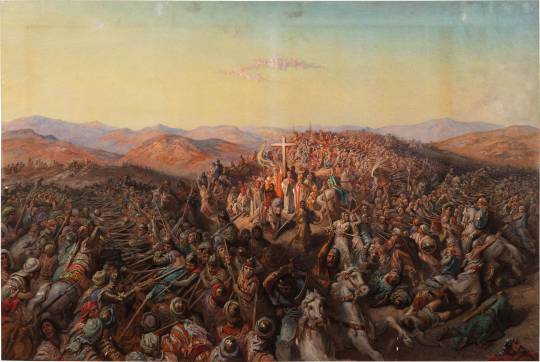
The Battle of Ascalon, 12 August 1099 by Gustave Doré
#gustave doré#art#battle of ascalon#first crusade#medieval#middle ages#crusaders#history#godefroy de bouillon#godfrey of bouillon#christian#christianity#crusades#crusade#crusader#knights#europe#european#fatimid caliphate#muslim#franks#frankish#true cross#levant#palestine#christendom#holy wars#holy war#mediaeval#bibliothèque des croisades
99 notes
·
View notes
Text
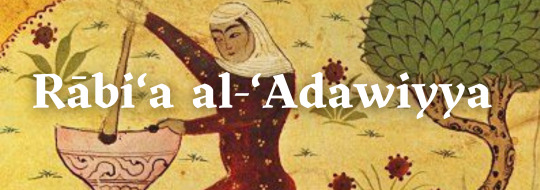
"Rābi‘a was a Muslim saint and Sufi mystic. Her contemporaries also considered her a teacher of character. There are strong elements of a Philosophy of Religion in her collection of poems which is one of the earliest to set forth a doctrine of Divine Love. The concepts that she propounds include a daring taxonomy of love and the notion that self-effacement does not erase one’s gender. She thus emphasized that women’s piety is superior to men’s (which suggests a feminist consciousness). Her poems reveal a refined mastery of Arab meters and an intricate reflection on Arabic letters and language. Her writing is part of early Sufi philosophy and has inspired Muslim mystics for centuries, among them luminaries al-Ghazzālī (d. 1111) and Farīd al-Dīn al-‘Aṭṭār (d. 1221). Some of her verses are present in all genres of Arab songs to this day.
Despite her fame as one of Islam’s greatest Sufi saints, the life of Rābi‘a al ‘Adawiyya al-Qaysiyya al-Baṣriyya (A. H. 95–185/C. E. 712–801), as she came to be known, “remains mostly elusive.” A number of Islamic sources state that she was born in Basra, a city founded by Muslims in 16/637 and known for its many ascetics. A more recent study suggests her native city may have been Damascus. Many Islamic biographical dictionaries record 185/801 as the year of her death, while one source indicates the year 135/752. The latter date seems highly unlikely, since Rābi‘a would then have been too young to meet some of the luminaries she is reported to have talked to, and she also would have died too early to have had exchanges with other distinguished visitors whose names have been associated with hers.
On occasion, her first name is given as Rāyi‘a, although this is no great concern since it may be safely imputed to the accidental addition of a diacritical point. The greater biographical question concerns her full name and whether it indicates that Rābi‘a (or her father) became a client to an Arab tribe upon conversion to Islam. And there is also the matter of her having been married or a singing slave-girl before she converted to mysticism. Part of the confusion is due to the conflation of the biographies of several female saints by the same first name or with a similar story.
Without any question, Rābi‘a left an indelible mark on Islamic mysticism like no other Sufi before her, man or woman. Many of the encounters she is reputed to have had with fellow ascetics (zāhidūn, plural of zāhid) and mystics (ṣūfiyyūn, plural of ṣūfiyy) such as Mālik ibn Dīnār (d. 123/648), Ḥasan al-Baṣrī (d.110/728), Sufyān al-Thawrī (d. 161/777–8), Ibrahīm ibn Adham (d. 165/782) ‘Abd al-Wāḥid al-Zayd (d. 177/793), and Rabāḥ al-Qaysī (d. 180/796) are obviously anecdotal, if only because a look at their respective dates clarifies that Rābi‘a could not possibly have been a contemporary to all of them.
And yet, it is conceivable that the exchanges said to have taken place with some of these very distinguished figures in Islamic tradition belonged to conversations conducted with interlocutors whose names were either lost or less prominent, in order to grant Rābi‘a a higher status. An exception is Ḥadīth-scholar Sufyān al-Thawrī, whose dates confirm him as a contemporary of the saint of Basra and whose name also appears in al-Sulamī’s Memorial. Moreover, as the following will show, the stories involving him strongly suggest that he shared an intimate spiritual bond with her.
Whoever Rābi‘a’s pious visitors were, they all bowed down before her extreme asceticism and the purity of her mystical experience. But this did not prevent them from sometimes provoking her and even testing the sincerity (ṣidq) of her religious sentiments. Agile of mind and never at loss for the right words, Rābi‘a always had the upper hand. One gets the impression that she welcomed the opportunity for verbal jousts. For instance, knowing her love of God, someone hoped to trick her by asking: “How is your love for the Prophet (may God bless and preserve him)?” She replied: “Verily, I love him. But love for the Creator has turned me away from love for created things”. Another visitor inquired about her take on Satan to which she answered: “My love for God leaves no room for hating Satan”.
On occasion, tradition recorded Rābia’s own questions to a number of individuals, making one wonder whether some of her interlocutors were not actually students of hers rather than frequent visitors. For instance, she asked them about “truthfulness” and “generosity,” clearly expecting them to give lacking answers that she would have to—and did—straighten out. Her style is reminiscent of the “What is”-question used among the “acusmatici” in the Pythagorean school. This is not to suggest that Rābi‘a was following the teaching model of this ancient Greek school, only that the parallel questioning style supports the assumption that Rābi‘a was teaching and not just receiving guests.
Some reactions to statements made in her presence, show how annoyed she could be at what she perceived to be pseudo-pious utterances. Sāliḥ al-Murrī(d. 176/792–93), who enjoyed reiterating, “When someone keeps knocking at the door, it will in time open for him,” was admonished by Rābi‘a: “How long will you keep saying that? When was the door ever closed, that it might have to open?” .This sharp riposte clearly suggests that she was in a position of authority when al-Murrī repeated his remark.
If incensed deliberately, Rābi‘a could be punishingly cruel. Thus when Ḥasan al-Baṣrī is said to have invited her to pray with him on the bare surface of a lake, Rābi‘a scolded him for being boastful. She then threw her prayer rug in the air and asked him to join her above the ground, which shamed him endlessly, since he was unable to comply. Naturally, neither of the two saints could have achieved the physical exploits they are credited with (apart from the fact that they couldn’t even have met at a stage in their lives when they were both spiritually mature), but the story nevertheless conveys how strongly Rābi‘a felt the need to correct her fellows, including well-established ones like al-Baṣrī, when she found them lacking in humility.
If nothing else, this “ḥikāya” tells us about how she was perceived. While the details of the sayings and deeds attributed to Rābi‘a may never be validated, nor falsified for that matter, what does come across is that Islam’s mystical tradition considers her a paragon in terms of her austerity, piety, and mystical teaching. Moreover, one senses the respect she was granted is not the expression of mere veneration for a person more advanced on the religious path. Rather, it is coupled with deference to an authoritative figure whose character and teaching were deemed exemplary."
Albertini Tamara, "Rābi‘a al-‘Adawiyya of Basra, 712–801/185–95", in: Waithe Mary Ellen, Boos Dykeman Therese (eds.), Women Philosophers from Non-Western Traditions: The First Four Thousand Years
#Rābi‘a al-‘Adawiyya#women in history#women's history#historyedit#female poets#female philosophers#middle eastern history#sufism#women in religion#philosophy#8th century#iraq#iraqi history#history#female authors#abassid caliphate
98 notes
·
View notes
Text
The greatest warrior in history, Imam Ali (AS) never lost a battle, yet he never claimed victory in his entire life except once; At his martyrdom, the moment the sword was struck on his head in prayer, as he calls out;
“By the Lord of the Kaaba, I have succeeded.”

#imamali#death anniversary#17ramadan#19ramadan#warrior#islamic history#history#islamic#islam#shahadat#hazrat ali#masjid#blackday#marsiya#caliph#shia muslims#muslim#shia#iraq#syria#noha#martyrdom#maula ali#imam hussain#imam husayn#ali ibn abi talib#kaaba#holy kaaba#ya ali#karbala
39 notes
·
View notes
Text
The Cairo Geniza illuminates many fascinating aspects of Jewish life under Islamic rule, but one that I find especially interesting is how some Jews used Islamic courts! Under Dhimmi laws, Jews were second-class citizens but retained the ability to have their own courts, known in Hebrew as a “Beit Din.”
To pressure Jewish courts to rule in their favor, many people threatened to turn to the ruling Islamic court for help if they lost their case (Oded Zinger argues that this was a particularly useful strategy for women, who were usually disadvantaged in local Jewish courts)
In some cases, they followed through on this threat. For example, TS 12.16 includes an 11th-century letter from the Jewish community of Rafah (now part of the Gaza Strip) complaining about a member going to an Islamic court after losing an inheritance dispute.
166 notes
·
View notes
Text

New Medieval Books: The Science of Music: Knowledge Production in Medieval Baghdad and Beyond
16 notes
·
View notes
Text
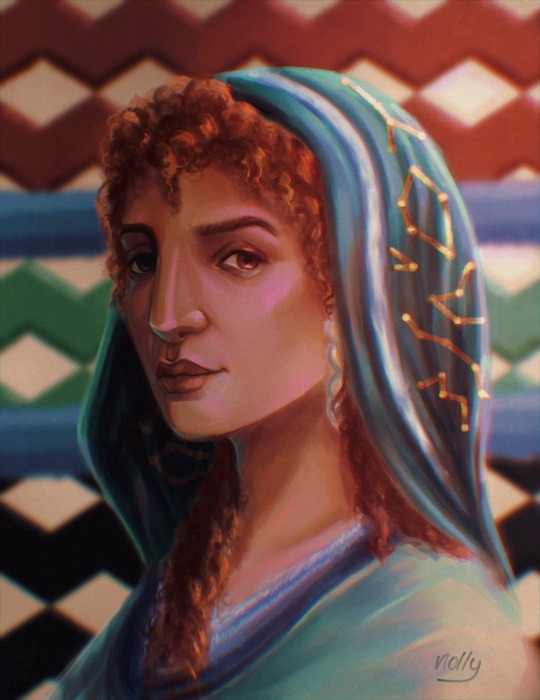
Never posted her here because it is unfinished and I don’t like a lot of things about it but this is an interpretation of Lluna Valentia bint Al Mualim De Bosch, the character from my Baldwin story.
She is from the Almohad Caliphate in Al Andalus (the Iberian Peninsula) daughter of a Muslim and a Christian.
#kingdom of heaven#king baldwin iv#baldwin iv#the leper king#my art#medieval#12th century#ipad art#procreate illustration#almohad caliphate#Spain history#arab history#berber#amazigh#iberia#moorish#wallada bint al mustafki#king baldwin x oc
43 notes
·
View notes
Text
Interesting parallels between the boyfriends:
Shortly before his death, Silahtar recounts to Murad the story of Irene of Athens, a Byzantine Empress who initially served as regent for her young son, Constantine VI. When he came of age, the two entered into conflict over imperial authority. Although Constantine eventually accepted her as co-ruler, Irene later had him seized, blinded, and imprisoned. He likely died soon after, and in 797, she declared herself Empress regnant of the Byzantine Empire, the first woman in history to rule it in her own right.
Then in ep55, we have Yusuf telling Murad the story of Al-Khayzuran, a slave concubine who became the legal wife of Caliph Al-Mahdi. She held an extraordinary and unusual degree of power, especially for a woman, during her husband's reign. After he died, she continued to try to rule through her sons, but her eldest, Musa al-Hadi opposed it. She is rumored to have poisoned him so she could enthrone his brother, Harun-al Rashid, who was perfectly willing to accept her influence on the state.
Sidenote: Silahtar chooses a Christian reference, while Yusuf chooses an Islamic one, which speaks of their different cultural heritage.
#magnificent century#magnificent century : kösem#parallels#kosem sultan#sultan murad iv#irene of athens#constantine vi#al-khayzuran#musa-al hadi#harun-al rashid#ottoman history#byzantine history#abbasid caliphate
5 notes
·
View notes
Text
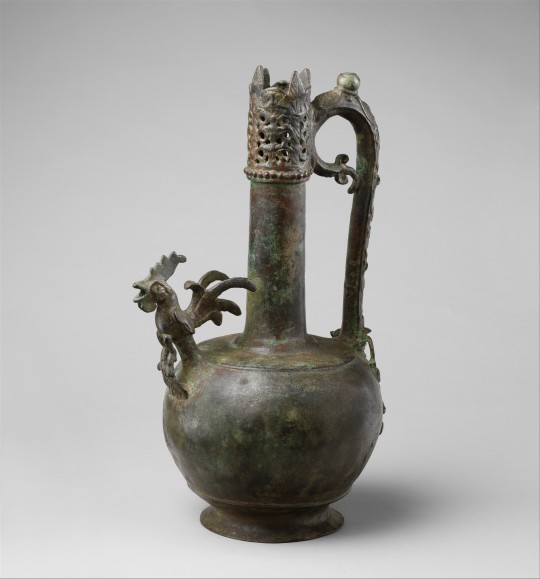
Ewer with a Cock-Shaped Spout, 8th–early 9th century. MET (ID: 41.65). An almost identical ewer was unearthed near the site where the last Umayyad caliph, Marwan II, was assassinated at Abu Sir in Egypt. Ewers of this type may have been produced in Syria for the Umayyad and early Abbasid caliphs. The pierced decorations follow Byzantine prototypes. The spout, in the shape of a three‑dimensional crowing cock with ruffled wings, is rendered with great realism. (MET)
#islamic#islamic history#islamic art#islamic culture#syria#syrian art#syrian history#umayyad#umayyad caliphate#medieval art#middle ages#medieval history
17 notes
·
View notes
Text
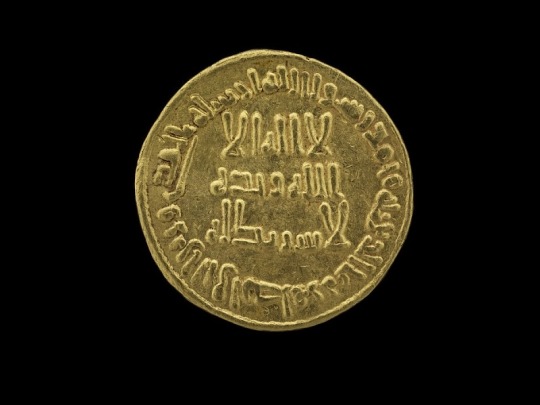
1 Dinar, Umayyad Dynasty, 713-714.
The Smithsonian Museum of American History.
#art#culture#history#middle eastern history#umayyad#umayyad caliphate#north africa#middle ages#medieval#medieval history#the smithsonian museum of american history#the smithsonian#coins
19 notes
·
View notes
Text
youtube
#Early Islamic caliphs#Umayyad family#Muslim naval fleet#Sassanid Empire#Unity of the Muslim world#Leadership challenges#Islamic symbols#Caliphate history#Early Islamic leaders#Islamic governance#Muslim conquests#Early Islamic society#Islamic history#Islamic leadership#Islamic conquests#Historical figures in Islam#Islamic civilization#Islamic empire#Muslim rulers#Islamic golden age#lost islamic history#usman#kurulus osman#Muslim world unity#Youtube
0 notes
Text
sinbad the sailor is so funny to me. a bunch of early abbasid era basran traders got around a table and said “hey. what if we make a guy who was like Odysseus … but if he sucked”
#and they were right. and it was beautiful.#one thousand and one nights#arabian nights#sinbad#sinbad the sailor#abbasid caliphate#history#history tumblr#the odyssey#odysseus#homer’s odyssey#the arabian nights#medieval Islam#islamic history#1001 nights#literature#arab literature
13 notes
·
View notes
Text
One of the rights of Sahabah (R.A) include to testify that those people will be in paradise whom Allah and his messenger صلى الله عليه وسلم testified that they will be in paradise, as in the Hadith of Abd-Ar Rahman ibn Awf (R.A), according to which the Muhammad صلى الله عليه وسلم said:
Abu Bakr will be in paradisse.
Umar will be in paradise.
Ali will be in paradise.
Uthman will be in paradise.
Talha will be in paradise.
Az- Zubayr will be in paradise.
Abd- Ar Rahman will be in paradise.
Sa’d Ibn Abi Waqqas will be in paradise.
Saeed Ibn Zayd Ibn Amr Ibn Nufayl will be in paradise.
Abu ubaydah Ibn Al- Jarrah will be in paradise.
Narrated by Ahmad, Abu Dawud and At-Tirmidhi, classed as sahih al- Albani.
#history#allahﷻ#islamicreminders#islamdaily#prophet muhammed pbuh#dua#welcome to islam#allah is kabir#allah is one#artists on tumblr#sahaba(ra)#sahabah#save palestine#sahabahs#companions of the prophet muhammad#the rightly guided caliphs#the last prophet#prophets#islam daily#learning islam together will keep this ummah together#convert to islam#islamislove#islampost#reverse 1999#revert
10 notes
·
View notes
Text


Stucco decoration was used extensively during the Abbasid dynasty. Different styles of stucco decoration were found in Samarra.


Above are some examples of Abbasid stucco styles from Afghanistan and Egypt
#abbasid caliphate#afghanistan#architecture#art history#academic reading#photography#islamic architecture#iraq#stucco
5 notes
·
View notes
Text
I keep not having the energy to write a proper podcast and have a bunch of half-completed scripts lying around. But today my OH asked me something about the podcast I was listening to about Viking raids on Mercia and I ended up telling him about that time St Francis of Assisi went to the Sultan of Baghdad (I forget who was ruling at the time. I think it might have been one of the Suliemans?) and tried to convert him to Catholicism because he was utterly sickened by the destruction and horror of the Crusades.
Basically turned up, unarmed and barely accompanied, at his court and offered to convert him by debate. And because this was 100% in line with the court culture of the Caliphate, the Sultan had no intention of being converted, but was like “Hey, turns out the Franks have proper holy men”, had a big load of debates with him through an interpreter, and then loaded him up with rich presents, which, being St Francis, he immediately gave to the local poor folk and went home. And that’s why he’s thought of remarkably well of in the area to this day.
And my OH was like “Perhaps I should just record the random stuff you’re really enthusiastic about that you tell me and we could put them out as some sort of recorded miscellany podcast?”
And they might have a point tbh.
#st francis of assisi#caliphate of baghdad#islamic history#catholic history#medieval history#podcasts#chronic illness#disability#disabled
9 notes
·
View notes
Text
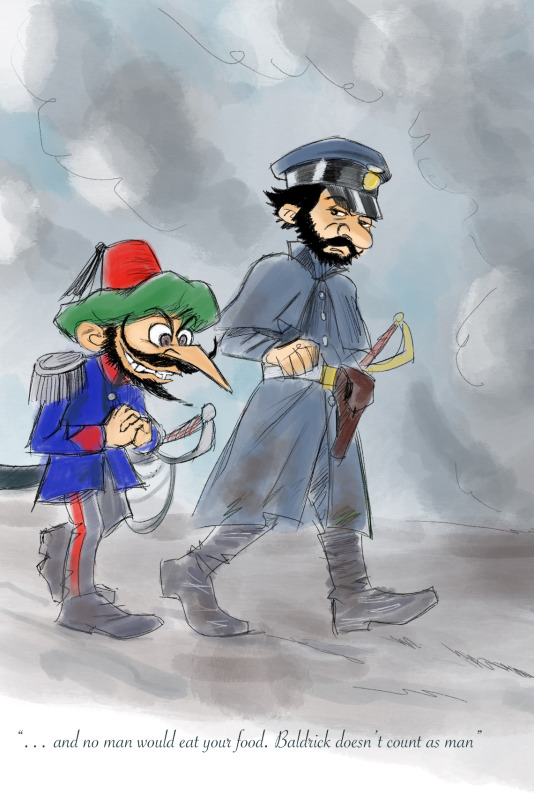
Iznogud and Blackadder fighting (bickering) along side eachother during the Crimean wars (sadly)
>Iznogud quips to Blackadder that his descendants will one day rule over England
>Blackadder retorts that Iznogud's kin will only amount to Barbers and Kebab Vendors
>They’re both right
>My God! They’re working together
>My Lord! With hearts as dry as leather
>The Foe,prepare for twice the wrath!
>For one plus one is simple Math
>BLACKADDER (and Iznogud)
>History’s Cunning Crooks
>BLACKADDER (and Iznogud)
>They’ll squeeze their way into the books!
>Prepare for utter certain doom
>The Russians, they don’t know what is coming
>Today they bicker in one room!
>Tomorrow,they’ll lead the dark roaring drumming!
>BLACKADDER (and Iznogud)
>They soon may be king and caliph!
>BLACKADDER (and Iznogud)
>If only they didn’t cause so much grief!
#blackadder#black adder#edmund blackadder#Iznogud#franco belgian comics#Franco Belgian#Turkish#ottoman#Ottoman Empire#British empire#British humour#I Want to Be Caliph Instead of Caliph#je veux être calife à la place du calife#history memes#history#Crimean war#crossover#crossover comic#rowan atkinson#toonblr#comic
2 notes
·
View notes